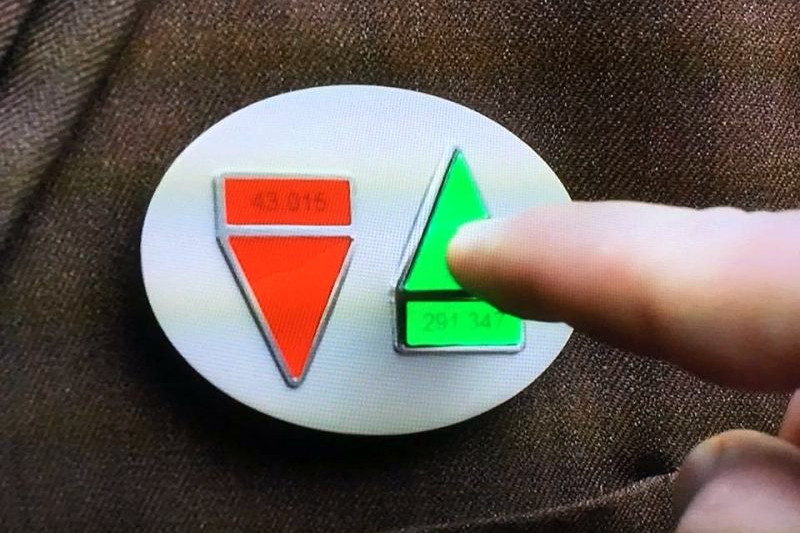It’s good to have one
Plan B








The other day, I was watching The Orville on Hulu – great show. You could describe it as a funny Star Trek show. In episode 7 of season 1, they deal with a society with majority rule. In essence, your behavior and performance are constantly judged by everyone – both online and offline with buttons on your shirt. It created almost a Black Mirror-esque of dystopian future.
It reminded me of this TED talk (video below) by Jon Ronson called “how one tweet can ruin your life”. You could call it social media justice.
Recently, an opinion piece appeared on the NY Times called “the cruelty of the call-out culture“.
Sometimes it feels like we live in this future today and I’m not a fan. We’ve grown beyond lynching and public shaming and built a justice system with impartial justices who enforce the rule of law. We vote for representatives in our government to lay down those laws. It really wasn’t pretty in the Middle Ages.
I think the power of social media is around awareness and public debate. The #metoo “campaign” did its work and was great in surfacing and creating awareness around unethical behavior. Those are valuable contributions to society. Public lynching is not – the courts are a better venue for that.

When you are in the middle of a project or starting/growing a company, you are laser-focused on the end goal. Every step you take, every decision you make is aimed to get closer to that goal.
Often that goal is far away or yet so close but still out of grasp. It ain’t over till the fat lady sings as the colloquialism goes. There is much truth to that. I like to say it is more of a marathon than a sprint. If you go too fast or expect too much early on, you will run out of steam, stamina or breath.
A marathon is long though and most projects and companies take a lot longer to come to life. You need intermediate steps to assess if you are making progress or heading in the right direction.
But you also need to celebrate. You did the work and you accomplished something. It is a reason to celebrate.
Often we have a tendency to wait until “the money is in the bank”, but there is no fault in celebrating a little while keeping the eye on the target. There is really no reason to think you will jinx it by celebrating too soon. Celebrate your accomplishment. It does not matter how big or small. Just calibrate the celebration to the appropriate size of the accomplishment and you will be fine.
Everyone likes to hear praise they accomplishment, nobody dislikes a celebration – even small ones – to acknowledge that fact. Just take a moment, recharge and move on to the next thing. Try it.

This video caught my eye this week. It’s a short film made by Keiichi Matsuda. He describes it as “Hyper-Reality presents a provocative and kaleidoscopic new vision of the future, where physical and virtual realities have merged, and the city is saturated in media.”
I think the biggest innovation in the coming decade will come out of display technology. I don’t know how it’s going to look like – that’s like predicting the smartphone in 1990. We know where it’s heading, but do not know exactly how it’s going to look like. There’s certainly a lot of technology developed which is going to help shape that future. We have AR, VR, OLED (most notably flexible displays) and a slew of other more niche display tech like holographic displays, short throw projectors, and plasma emission displays.
The question is how we’re going to use that technology in the real world. This video is inspiring potential vision on how that future can look like. I’m taking an optimistic attitude even though it might look a bit overwhelming.

A long time ago, I was chatting with an HR manager at Philips. He was a veteran. At the time Shapeways was a Philips venture and we were located on their campus in Eindhoven, The Netherlands.
I asked him what in his opinion the biggest mistakes was people make in their careers.
His answer was foregoing opportunities because the opportunity did not fit the career path they set out for themselves.
Employees come in from college with a general idea on how to they want their career to progress and they are laser-focused on following that career path. In their minds it is the path which they laid out for themselves is the only way to get where they want to end up.
In reality this often not the case and the path is not always as linear as you think it is. According to the HR manager, it often led to people getting stuck in a position without a clear path forward. For instance, their business unit might be showing neutral growth or – worse – negative growth. In the past, they passed on lateral moves because they were not upward nor fitted the path they set out to walk on.
His advice was to always seize the opportunity. Opportunities often arise out of success. In his career, most successful careers were people who took every opportunity which was presented to them – lateral or not.
The lesson is that whatever you do, keep your goals in mind but don’t worry too much about the path.

This morning I was reading an article by Chris Dixon (VC at a16z) at Wired. I wholeheartedly agree with his reasoning. This is my take on it.
The basic internet technologies like HTTP (to run websites), TCP/IP (to let devices communicate between each other) and DNS (to map domain names to a server) are all open. It’s one of the major reasons the internet could grow as big as it did.
Most of the service layer of the internet like servers and routers, run open source software or are mostly built on of open source software. Android and many other devices out there run on Linux which is an open source kernel – the heart of the operating system.
But the application layer where we interact on the internet has gone closed. Platforms like Facebook, Amazon, and Google are all closed. The push for the decentralization stems from this and the excitement around blockchain and crypto is because of the promise to open up these platforms.
The problem with these closed platforms is the arbitrary nature of governing of access to these platforms. I call it arbitrary not because there is no reason for the way they’re governed (mostly to maximize profit), but the effects the governing has on the users of those platforms.
Facebook has changed their strategy around the newsfeed a few times and the fall out among the business users was significant. Take for instance Zynga which went big on social gaming on Facebook and then Facebook decided to deprioritize social gaming in their feeds.
Amazon is battling with their marketplace suppliers on multiple fronts. One of them is the absorption of successful staple items into their AmazonBasics brand taking away market from their own suppliers. Also, they’re battling with fraudulent behavior on their platforms like fake reviews which lead to suspension and withholding of revenue. In turn that got weaponized where vendors leave fake reviews with competitors to push them out of the marketplace.
Google changes their search algorithm all the time. In Europe, they’ve been accused and fined for deprioritizing search results which compete with their own.
Apple has a tendency to do the same by leveraging to their platform to push their own services while making it hard or impossible for competitors to get access. The HomePod only supports Apple Music for now.
The problem is that these large platforms see the innovation happening on the edges of their platform and absorb them into their own business while pushing out existing companies. This makes perfect business sense but it also makes them unreliable business partners.
But most of all, it absolutely kills innovation. Why put effort into building and launching a successful new service when you can predict that in the future the internet giants will take it away. It’s not a premise for success and it’s hard to raise funding for that.
Blockchain and crypto might be a solution. Time will tell. As Chris Dixon writes, “It took twenty years for open source software to supplant proprietary software, and it could take just as long for open services to supplant proprietary services.” Regardless, this problem needs to be solved. Internet regulation is never fundamentally going to solve this problem, it just stems the tide.
The promise of decentralization makes the tech community including myself so excited about blockchain and crypto. It’ll free us from the grasp of these internet giants and let us innovate again.